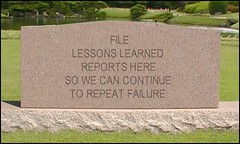In this blog post I want to contrast two software systems, the Lessons Database, and the Lessons Management System.
There are two types of Lessons Learned approaches, which you could differentiate as "Lessons for Information" and "Lessons for Action".
These represent maturity levels 1 and 2 from my three level categorisation, and can be described as follows.
"Lessons for Information" is where lessons are captured and put in reports, or in a database, in that hope that people will look for them, read them, and assimilate them.
"Lessons for Action" is where lessons are used to drive change and improvement. Lessons are captured, reviewed, validated, and action is taken to embed the lessons in process, procedure, standards and/or training.
"Lessons for Information" is supported by a Lessons Database, "Lessons for Action" by a Lessons Management System. Let's contrast the two.
- In a Lessons Database, the database is the final home of the lessons. In a Lessons Management System, the final home of lessons is considered to be the compiled knowledge of the organisation, which may be procedures, doctrine, guidance, best practices, wikis, etc. The Lesson Management System manages lessons on the way to their final homes.
- In a Lessons Database, lessons reach their reader through search. In a Lessons Management System, lessons are pro-actively routed to those who need to see them and to take action.
- In a Lessons Database, lessons accumulate over time (this was the problem with my first Lessons system in the 90s - it got clogged up over time with thousands of lessons, until people stopped looking). In a Lessons Management System, lessons are archived once they have been embedded into process and procedure, and the only live content in the system is the set of lessons currently under review.
- In a Lesson Database there is only one type of lesson - the published lesson. In a Lesson Management system there are at least two types of lesson - the open lesson (where action has not yet been taken) and the closed lesson, which may then be archived. Some organisations recognize other types, such as the draft lesson (not yet validated) and the Parked lesson (where action cannot yet be taken, or where action is unclear, and where the lesson needs to be revisited in the future).
- In a Lessons Database, there may be duplicate lessons, out of date lessons, or contradictory lessons. Through the use of a Lessons Management System, these have all been resolved during the incorporation into guidance.
- In a Lessons Database, there are limited options for metricating the process. You can measure how many lessons are in the system, but that's about it (unless you capture data on re-use). Through the use of a Lessons Management System, you can track lessons through to action, and can measure whether they are being embedded into process, you can see where they are being held up, and by whom, and you can see how long the process is taking and where it needs to be speeded up.





No comments:
Post a Comment